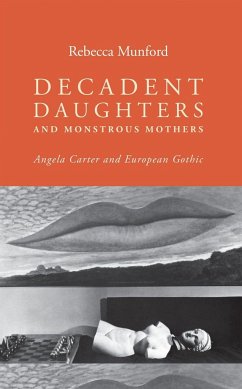Decadent daughters and monstrous mothers interrogates the vexed question of Angela Carter's feminist politics through the dusty lens of European Gothic. It illuminates her ambivalent relation to some of her most contentious European literary forebears, reveals her rich knowledge of French literature and offers fresh insights into her literary practices afforded by newly available archival material. Owing to her fascination with pornography and the imprisoning fantasies of self-sacrificing and monstrous femininity emerging from a male-authored bloodline of European Gothic, Carter's fictions have been censured for their complicity with a fetishistic and sadistic erotic register. This book revisits the uncomfortable contradictions of Carter's writing. It analyses her textual engagements with a dirty lineage that can be mapped from the Marquis de Sade's obsession with desecration and defilement, through Baudelaire's perverse decompositions of the muse and decadent imaginings of infernal femininity, to surrealism's violent dreams of abjection. While Carter's writing might suggest a closer alignment with the unflinching brutality of the Marquis de Sade's Gothic theatre than with Ann Radcliffe's Gothic of sensibility, Decadent daughters and monstrous mothers argues that Carter's most troublesome engagements with her European Gothic forefathers are unexpectedly those which are most vital to a consideration of her feminist politics. Decadent daughters and monstrous mothers will be of interest to researchers and students working on contemporary women's writing, the Gothic and comparative literature.
Hinweis: Dieser Artikel kann nur an eine deutsche Lieferadresse ausgeliefert werden.
Hinweis: Dieser Artikel kann nur an eine deutsche Lieferadresse ausgeliefert werden.








